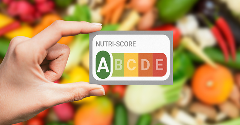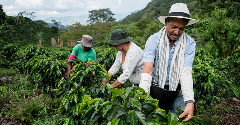News
Mars, Danone, Nestlé, Unilever create alliance
19 Jul 2018Four of America's largest food companies have launched the Sustainable Food Policy Alliance, a new organisation focused on driving progress in public policies that shape what people eat and how it impacts their health, communities, and the planet.

Four of America's largest food companies have launched the Sustainable Food Policy Alliance, a new organisation focused on driving progress in public policies that shape what people eat and how it impacts their health, communities, and the planet. Founding member companies include Danone North America; Mars, Incorporated; Nestlé USA; and Unilever United States.
The four founding member companies say they have already made broad updates to their portfolios in recent years, collectively and voluntarily advancing issues like sodium reduction, responsible marketing and transparency, and reducing their impact on the planet, including cutting greenhouse gas emissions. As the Sustainable Food Policy Alliance (Alliance), member companies will prioritise U.S. public policy advocacy and action in five key areas: + Consumer Transparency: Improving the quality and accessibility of information available to consumers about the food they purchase for themselves and their families.+ Environment: Advocating for innovative, science-based solutions to take action against the costly impacts of climate change, build more resilient communities, promote renewable energy, and further develop sustainable agriculture systems.+ Food Safety: Ensuring the quality and safety of food products and the global supply chain.+ Nutrition: Developing and advocating for policies that help people make better-informed food choices that contribute to healthy eating while supporting sustainable environmental practices.+ People and Communities: Advancing policies that promote a strong, diverse, and healthy workplace and support the supply chain, including rural economies.At launch, two important policy areas the Alliance intends to engage on include: nutrition labeling and carbon emissions. The Alliance says it supports a comprehensive update of the definition of terms important for people, like "healthy," including strong, science-based regulations on how these terms can be used on food packages and in marketing. The updates will help consumers make better choices for themselves and their families. The Alliance will also work to advance climate policies that are impactful for the environment, while accounting for the specific business imperatives of supply chains, including farmers, ranchers, and other producers. This will include: + Urging U.S. policymakers to ensure the Farm Bill and other farm policies reflect the pressing need to increase the scale of actions to address water quality and water conservation issues, focus on improving soil health, and expand the deployment of renewable energy, particularly wind and solar. The Farm Bill should leverage all available tools, including research and public-private partnerships such as the Regional Conservation Partnership Program (RCPP), to make smart investments in conservation and sustainability.+ Exploring the economics of sustainability, including financial incentives to reduce emissions and transition to low-carbon alternatives, with a particular focus on ways to create value for farmers, ranchers, and others who are implementing leading-edge practices to cut greenhouse gas emissions.+ Advocating on behalf of smart, comprehensive energy and environmental policies at the state, national, and international levels, including the Paris Climate Agreement, the Clean Power Plan or other commitments that result in change necessary to reduce greenhouse gas emissions in line with what evidence-based science says is necessary.In a joint statement, Mariano Lozano, CEO, Danone North America; Tracey Massey, president, Mars Wrigley Confectionery Americas; Steve Presley, chairman and CEO, Nestlé USA; and Amanda Sourry, president, Unilever North America said: "The Sustainable Food Policy Alliance was founded on the principle that food companies can and should be doing more to lead and drive positive policy action for the people who buy and enjoy the foods and beverages we make, the people who supply them, and the planet on which we all rely. "As an Alliance, we commit first and foremost to leading by example. Each member company has independently proven a willingness to advocate for the long-term interests of the people who farm and supply our raw materials, and people who make and consume our products. "We are committed to a collaborative approach and to listen and learn about issues affecting all parts of our food system from the field to the store shelf and beyond. We understand that we don't have all the answers and will rely on the best available evidence-based science to inform our positions. We will be transparent about how we reach our decisions and what we hope to achieve."With so many pressing food policy opportunities on the horizon, now is the time to help steer America's food policy and our food system on a better path for long-termRelated news

UK to ban junk food TV advertisements before 9pm
3 Oct 2024
In a bid to reduce childhood obesity, the UK government has introduced a policy, coming into effect on 1 October 2025, banning junk food advertising on television before the 9pm watershed.
Read more
Which food and beverage brands made TIME’s Most Influential Companies list?
2 Oct 2024
Chickpea pasta, prebiotic sodas, food boxes, non-alcoholic beer, and a soil carbon marketplace are the specialties of the five food and beverage brands that earned a spot on TIME’s 2024 list.
Read more
New environmental food scoring standards emerge
30 Sep 2024
EIT Food and Foundation Earth collaborate to launch environmental food scoring for products entering the global supply chain.
Read more
Danone removes NutriScore from products
20 Sep 2024
Following an algorithm update that gives some of its sweetened drinks a worse score, Danone has removed the front-of-pack label, NutriScore, from all of its products – putting profit before public health, say campaigners.
Read more
Nestlé develops a new fat reduction method for dairy ingredients
26 Aug 2024
A Brazil-based Nestlé research and development team has developed a way to reduce the fat in milk powder by as much as 60%, without impacting the key characteristics that consumers enjoy.
Read more
Better Juice expands its range to sorbets
16 Aug 2024
Food tech startup Better Juice has developed a technology to reduce the sugar content in fruit sorbets. The process retains the natural vitamins, minerals, and flavours of fruit, while offering manufacturers an easy-to-implement and scalable solution t...
Read more
German study reveals high sugar, fat, and salt levels in children's foods
13 Aug 2024
The food industry is making slow progress in reducing the high levels of sugar, fat, and salt in German food and beverage products marketed to children, according to the Max Rubner Institute (MRI).
Read more
Swedish court overturns prohibition on winery’s use of imported frozen grapes
12 Aug 2024
Swedish company Drood Winery has successfully challenged the Swedish Food Agency’s decision to prohibit the production and sale of their product made from frozen grapes imported from Iran.
Read more
Paris Olympics: Food and beverage brands champion health, fun, and sustainability
5 Aug 2024
Food and beverage brands are aligning with the Paris Olympics 2024 Food Vision, which emphasises sustainability, local sourcing, and plant-based diets.
Read more
The coffee supply chain is failing farmers, says Solidaridad
30 Jul 2024
The coffee industry’s economic model means its profits do not reach farmers, despite there being enough value to be shared all along the supply chain, according to a new report by Solidaridad Network and IDH.
Read more